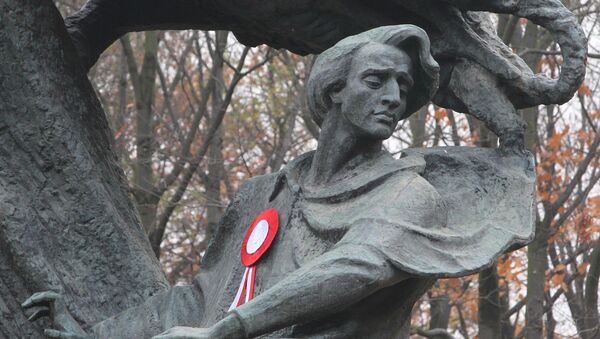MOSCOW, November 17 (Sputnik) — As Frederic Chopin was dying on his bed in Paris in 1849, he whispered a request which has become a musical legend. He said "Remove my heart after I die and entomb it in Poland." The composer wanted his heart to rest in the native land he desperately craved for from his self-imposed exile in France, according to Associated Press.
Since his death, Chopin’s body has rested at the Pere Lachaise cemetery in Paris, whereas his heart has endured a long journey of intrigue and adulation.
First, it was sealed in a jar of liquor, supposedly cognac. Then it was moved to Warsaw beyond Russian border control. In his hometown, Chopin’s heart passed through the hands of several relatives and was enshrined within a pillar in the Holy Cross Church. During World War II, it was briefly held by the Nazis.
The heart has been exhumed several times, most recently in a secret operation to check whether the tissue remains well preserved, AP reports.
Poland does not usually revere the relics of saints; however Chopin’s heart is an object for a deep fascination in the country. For Poles, Chopin’s nostalgic compositions are reflective of the national spirit, and the fate of his heart is interlaced with Poland’s greatest triumphs and failures over nearly two centuries of foreign occupation, warfare and liberation.
"This is a very emotional object for Poles," said Michal Witt, a geneticist involved in the inspection, as quoted by the AP. Chopin is "extremely special for the Polish soul."
Chopin experts planned to conduct genetic testing to establish whether the composer died of tuberculosis, the official cause of death, or it was some other illness, but it was not possible. The custodians of the heart – the Polish church and government – have repeatedly refused requests for any invasive tests, partly due to the opposition of a relative of the composer.
However, this year, specialists finally consented to a superficial inspection after a forensic scientist supposed that after many years the alcohol could have evaporated from the jar leaving the heart to dry up and darken.
On April 14, a group of 13 people came to the Holy Cross Church. Among them there were the archbishop of Warsaw, the culture minister, two scientist and other officials.
They worked in total concentration, mostly whispering, as they removed the heart from its resting place and inspected it, taking more than 1,000 pictures and adding hot wax to the jar’s seal in order to prevent evaporation. Warsaw’s archbishop said grace over the heart. Then it was returned to its place. By morning, visitors to the church could see no trace of the inspection, according to AP.
"The spirit of this night was very sublime," said Tadeusz Dobosz, the forensic scientist on the team.
Polish officials kept all details of the exhumation secret for five month before speaking publicly about it in September. They are also not releasing photos of the heart, mindful of ethical considerations surrounding display of human remains, said Artur Szklener, director of the Fryderyk Chopin Institute in Warsaw, a state body that helps preserve the composer's legacy.
"We do not want this to be a media sensation, with photos of the heart in the newspapers," Szklener noted.
Still, he proved that the heart is in good condition showing AP some of its photographs. The agency described the organ as "an enlarged white lump submerged in an amber-colored fluid in a crystal jar".
Some Chopin experts have gone critical of what they call a lack of transparency.
Steven Lagerberg, the American author of "Chopin's Heart: The Quest to Identify the Mysterious Illness of the World's Most Beloved Composer", believes international experts should have taken part in the inspection. He said he wishes the procedure had involved genetic tests to determine the cause of the composer’s death.
Though Laderberg and other specialists are sure that Chopin died of tuberculosis, the issue continues to attract scientists. Some of them suspect cystic fibrosis, a disease unknown in Chopin’s time, or even some other illnesses.
"The mystery of this man's illness lingers on — how he could survive for so long with such a chronic illness and how he could write pieces of such extraordinary beauty," Lagerberg said. "It is an intellectual puzzle, it is a medical mystery and it is an issue of great scientific curiosity."
Bogdan Zdrojewski, the culture minister who took part in the April inspection, defended his refusal to allow invasive testing of the heart.
"Additional information which could possibly be gained about his death would not be enough of a reason to disturb Chopin's heart," he stressed.
One way or another, another inspection is planned to take place 50 years from now, according to officials.

